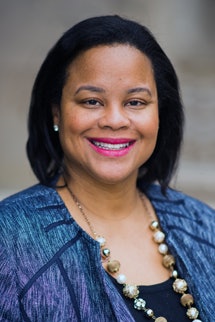Howard University’s School of Law made a name for itself decades ago, blazing trails with graduates and professors making the legal arguments in courts across the country for civil rights for minorities.
Thurgood Marshall, the late Howard Law School alum who successfully argued major civil rights cases and eventually became a justice of the U.S. Supreme Court, headlines a long, prestigious list of individuals who traced their legal roots to the Howard law school, opened in 1869, just after the U.S. Civil War.
 Danielle Holley-Walker
Danielle Holley-WalkerThe issues raised by Marshall, his colleagues, predecessors and successors, may have changed in name and style, yet not so much in substance, say law veterans across the nation. There is still widespread racial and economic discrimination in all aspects of society from health care to housing, from police treatment of civilians to treatment in the courts.
“We have just as many civil rights issues today as we had 50 years ago,” says Howard law school Dean Danielle Holley-Walker, the 43-year-old lawyer who was hired in 2014 to run the law school. She says that recent events, from the death of Freddie Gray in Baltimore to the police shooting of Michael Brown in Ferguson, Missouri are reminders of the work to be done.
“We have a very critical mission at this time,” says Holley-Walker, referring to the uncertainty across the nation about civil rights and immigration issues. Howard law school and its peer institutions “need to produce more lawyers in civil justice reform, voting right law, immigration law and education,” she says, as she ticked off a list of issues confronting the nation.
The law school has opened The Thurgood Marshall Civil Rights Center to help emphasize its focus on the law school’s “brand” of law. For sure, it has expanded its portfolio overall, she says, yet everything is rooted in the law school’s century-and-a-half commitment to justice. There are symbolic reminders showered about the law school campus in Northwest Washington D.C., including busts of Marshall and his mentor, Charles Hamilton Houston, a legend in Howard law school history.
Holley-Walker, who left her post as associate dean at the University of North Carolina to take on the Howard challenge, says the law school has been fortunate in the past decade or two with respect to admissions, enrollment and sustenance.
Enrollment saw a slight enrollment drop around 2014, but the law school quickly bounced back.
When competition for students stiffened and ballooned in the 1990’s and beyond, Howard did not resort to lowering its admissions standards to ward off competition for students, says observers, adding that Holley-Walker has pushed the pedal to the medal in fundraising in an effort to keep the costs of going to law school as low as possible.
Holley-Walker, who earned her B.A. at Yale University and J.D. in law at Harvard University, comes from a family of lawyers. Her father, Houston attorney and law professor Dannye Holley, is the retired dean of the law school at Texas Southern University.
In her role as an educator, Holley-Walker says that she insists that her students do their best and she in turn, stretches her hand as a teacher to help them.
“I always wanted to teach,” she says, adding that she developed a focus on education and civil rights early on.
Since coming to Howard, Holley-Walker has acted to “greatly expand the academic success and bar preparedness program.” An indication of the impact of the program is 79 percent of law school graduates in 2017 passed their bar exam on first test. That was up from a 62 percent passage rate in 2015, she says, adding that her goal is to achieve a 90 percent bar passage rate on the first test.
The enhanced academic success and bar preparation “starts before their first day in law school and goes through graduation,” says Holley- Walker.
While trying to help her students learn the art of practicing law, Holley-Walker say that her focus is on helping to make sure that the law school is as affordable as possible.
“Legal education has always been very expensive,” she says. “Many law students, 62 percent are female, and are coming to law school with financial debt. We have that challenge at keeping tuition as low as possible.”
Holley-Walker says that about 50 percent of the law school’s more than 400 students, get financial aid of some amount from the university for each of the three years of the program. “It takes a lot of resources to maintain that kind of giving,” she she says. “We definitely need a lot more.”
This article appeared in the July 12, 2018 issue of Diverse. It is one in a series of stories about law school deans.


















